Introduction
Travel planning in 2025 has been transformed by artificial intelligence. The days of manually piecing together itineraries across dozens of browser tabs, second-guessing the best time to book, and juggling confirmation emails are rapidly disappearing.
Instead, AI-powered travel assistants are emerging as personal trip concierges—handling everything from instant itinerary generation to automated booking organization and real-time travel updates.
Five platforms lead this revolution: Layla (formerly Roam Around), TripIt, Mindtrip, Wonderplan, and Google Travel with Gemini integration. Each brings distinct strengths to the table—from lightning-fast AI itinerary creation to automated email parsing and comprehensive ecosystem integration.
This comprehensive guide compares these five AI travel assistants across multiple dimensions: AI capabilities, budgeting tools, group collaboration, platform availability, pricing, and ideal user profiles. Whether you’re a spontaneous explorer, detail-oriented planner, or business traveler, this comparison will help you choose the right digital travel companion.
Table of Contents
What Is an AI Travel Assistant?
An AI travel assistant is a digital tool that uses artificial intelligence to streamline every aspect of trip planning—from destination research and itinerary creation to booking management and real-time updates.
Unlike traditional travel websites that simply display options, AI assistants:
- Learn your preferences and adapt recommendations accordingly
- Generate personalized itineraries based on your interests, budget, and travel style
- Optimize routes and timing to maximize efficiency
- Provide real-time updates on flights, weather, and local events
- Manage budgets and track expenses automatically
- Enable collaboration for group travel planning
Think of them as having a knowledgeable travel agent available 24/7—one that remembers your preferences, never gets tired, and costs a fraction of traditional services.
Why AI Travel Assistants Are Booming in 2025
The adoption of AI travel tools has accelerated dramatically. Here’s why:
1. Time Savings
What takes hours of research, AI accomplishes in under 2 minutes with personalized recommendations. Travelers are reclaiming precious time previously spent comparing options across multiple platforms.
2. Personalization at Scale
AI analyzes your preferences, past trips, and real-time data to create truly customized experiences—something impossible with generic travel guides.
3. Cost Optimization
Smart algorithms help travelers surface insights and plan more efficiently, finding deals and optimizing spending that humans might miss.
4. Post-Pandemic Confidence
Travelers want reliable, up-to-date information about safety, restrictions, and local conditions—areas where AI excels with real-time data integration.
5. Mobile-First Convenience
Most AI travel assistants work seamlessly on smartphones, making planning possible anywhere, anytime.
The 5 Best AI Travel Assistants: Detailed Comparison
1. Layla (Formerly Roam Around) — The Instant Itinerary Generator
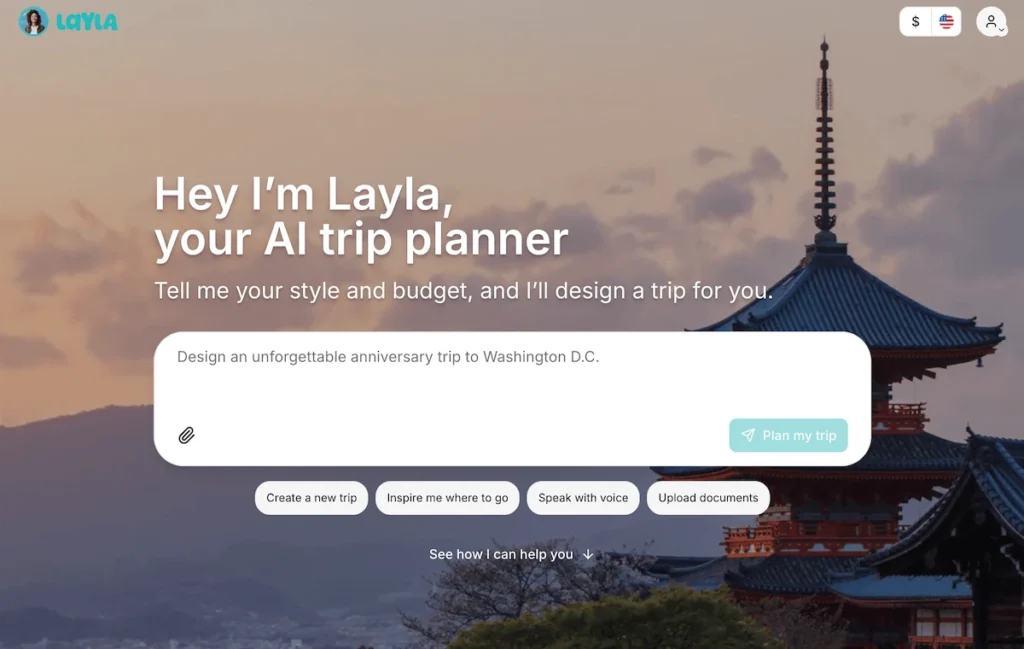
Primary Focus: Lightning-fast AI itinerary generation and travel discovery
Platform: iOS, Android, Web
Pricing: Free (with optional premium features)
Best For: Travelers needing quick, personalized itineraries; spontaneous trip planners
What Makes Layla Special
Layla is trusted by over 1.1 million travelers and has created over 10 million unique travel plans since its launch. The platform uses generative AI to instantly create detailed, day-by-day itineraries from simple prompts like “A 3-day trip to Paris for a couple who loves art and food.”
Key Features
- Lightning-Fast Generation: Create complete personalized itineraries in minutes, covering flights, hotels, activities, dining, and tailored recommendations
- AI Chat Function: Real-time conversation to adjust plans, ask questions, or explore new ideas
- Booking Integration: Access up-to-date pricing and availability for flights, hotels, and activities through partnerships with Booking.com and Skyscanner
- Video Content Inspiration: Discover destinations through inspiring video content from travel creators, allowing you to visualize potential destinations
- Bucket List Creation: Create shared bucket lists and collaborate with friends
- Free to Use: Free service with no mandatory subscription, making it accessible to all travelers
AI Integration Depth
High. Layla uses GPT-3 technology to provide tailored travel recommendations, learning from your preferences and travel style to deliver increasingly personalized suggestions.
Strengths
✅ Fastest itinerary generation in the market—from idea to detailed plan in seconds
✅ Helps find the best deals and offers, saving money on travel plans with expert guidance on budget-friendly options
✅ Uncovers hidden gems and off-the-beaten-path destinations often overlooked by mainstream tourists
✅ Extensive database covering destinations worldwide, from bustling cities to tranquil islands
✅ Conversational interface that feels more like chatting with a human travel agent than a typical AI
Limitations
❌ Requires stable internet connection to function effectively; limited offline capabilities
❌ Itineraries should be viewed as starting points rather than definitive plans; advisable to further personalize and verify venue status
❌ May lack the granular hour-by-hour detail some structured planners prefer
❌ Primarily focuses on inspiration and planning; doesn’t directly book within the platform
Ideal User Profile
- Spontaneous travelers who want quick trip ideas
- Users seeking instant inspiration and structure
- Travelers who value speed and simplicity
- Anyone new to trip planning who needs guidance
- Solo travelers, families, business travelers, groups of friends, and couples planning honeymoons
2. TripIt — The Automated Logistics Organizer
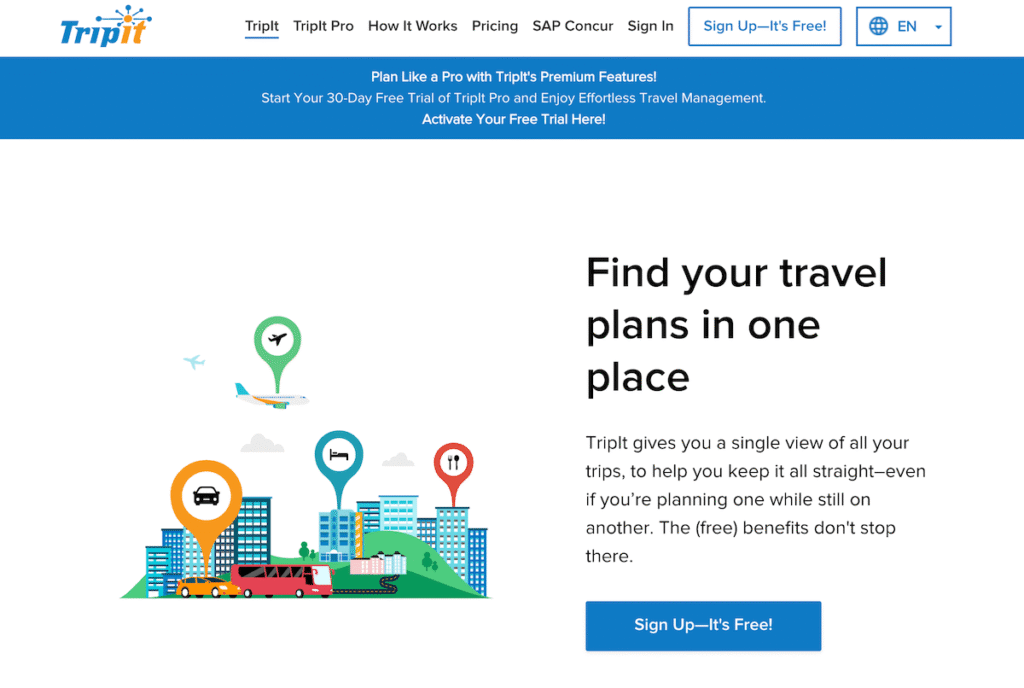
Primary Focus: Automatic itinerary assembly and trip organization from booking confirmations
Platform: iOS (including Apple Watch), Android (including Android Wear), Web
Pricing: Free basic plan; TripIt Pro at $49/year
Best For: Business travelers, frequent flyers, organization-focused users
What Makes TripIt Special
TripIt scans forwarded booking confirmation emails (flights, hotels, cars, activities) and instantly creates a single, clean master itinerary. It’s not about discovering trips—it’s about organizing them effortlessly.
Key Features
- Automatic Email Parsing: Simply forward confirmation emails to plans@tripit.com and TripIt automatically creates a comprehensive itinerary, eliminating manual data entry
- Real-Time Flight Alerts: TripIt Pro uses predictive AI for flight delay, cancellation, and gate change alerts, keeping you ahead of disruptions
- Calendar Sync: Syncs to Apple, Google, and Microsoft Outlook calendars; automatically adjusts for time zones
- Offline Access: Full itinerary available without internet connection
- TripIt Pro Features: Seat tracker, fare tracker (monitors prices for potential refunds), inner circle sharing, international tools, document storage
- Apple Watch Integration: Quick access to flight info and confirmations on your wrist
AI Integration Depth
Medium. TripIt’s intelligence focuses on automation and pattern recognition rather than creative trip planning. Its AI excels at parsing diverse email formats and predicting travel disruptions.
Strengths
✅ Unmatched automation—effortlessly consolidates all bookings from any provider
✅ Flight refund monitoring checks airfares to see if better prices are available than what you paid
✅ Excellent mobile and web apps with seamless calendar integration
✅ Solves the universal problem of travel information sprawl—indispensable organizational AI that works regardless of where you book
✅ Perfect for juggling multiple trips simultaneously
Limitations
❌ Not a “creative” AI planner—no discovery engine or inspiration features
❌ Doesn’t help with initial trip planning or destination research
❌ Limited budgeting or personalization features
❌ Premium features require Pro subscription ($49/year)
Ideal User Profile
- Business travelers with frequent, complex itineraries
- Frequent flyers needing real-time flight updates
- Users who book through multiple platforms and need central organization
- Anyone prioritizing “set it and forget it” automation over discovery
- Travelers who value logistics management over exploration
3. Mindtrip — The Visual AI Travel Companion
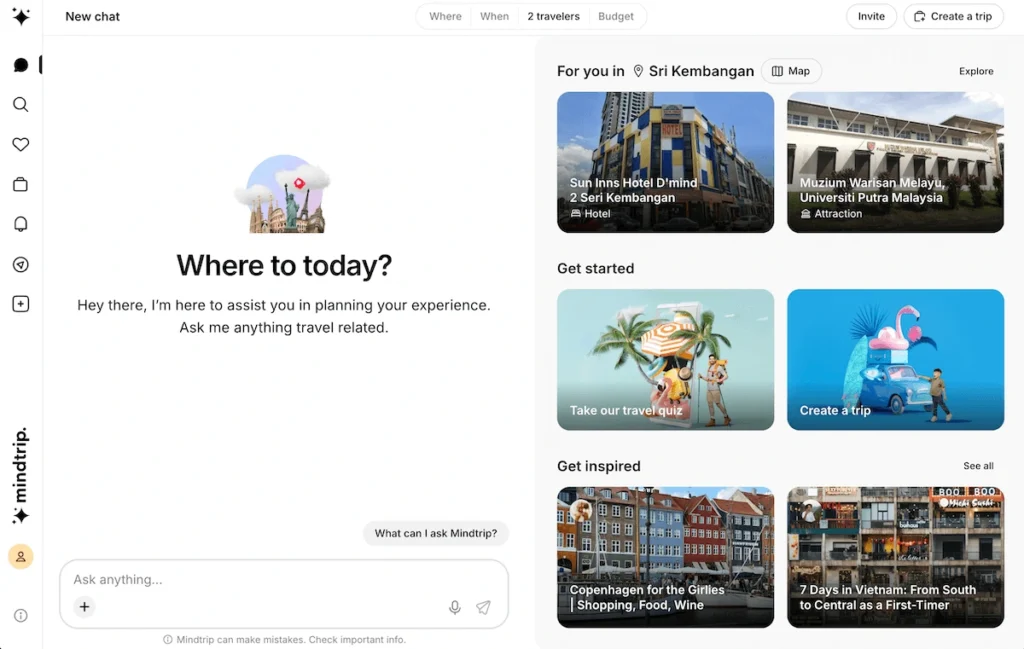
Primary Focus: Visual-first AI travel planning with real-time booking integration and creator community
Platform: iOS, Android, Web
Pricing: Free (commission-based model on bookings)
Best For: Visual planners, group travel coordinators, travel content creators
What Makes Mindtrip Special
Mindtrip is a generative AI-native platform built by former executives from Apple, Google, and LinkedIn. With $19 million in funding and a knowledge base of 6.5 million points of interest, it transforms traditional text-heavy travel planning into an engaging visual experience with photo-rich interfaces and interactive features.
Key Features
- Start Anywhere™: Revolutionary feature that lets you transform any travel content (Instagram posts, TikTok videos, blog articles) into customizable itineraries with a single tap
- Visual-First Planning: High-quality photography, interactive maps, and immersive images that bring destinations to life
- Real-Time Booking Integration: Up-to-date pricing and availability for flights, hotels, restaurants, and activities with direct booking capability
- Conversational AI Assistant: Chat naturally with AI about destinations, ask questions, and get instant recommendations tailored to your preferences
- Email Receipt Parsing: Forward confirmations to receipts@mindtrip.ai and Mindtrip automatically organizes your bookings in one place
- Creator Program: Travel content creators can share recommendations and earn up to $10,000/month through revenue-sharing on bookings
- Magic Camera: Point your phone at landmarks, signs, or menus for instant identification and translation
- Collaborative Planning: Invite travel companions to join your trip and plan together in real-time
AI Integration Depth
Very High. Built on top of current large language models (LLMs) like ChatGPT, Mindtrip’s AI assistant is tightly integrated with accurate real-time travel data, creating a truly AI-native experience. The platform gets smarter with each interaction.
Strengths
✅ Most visually engaging platform—transforms planning into an inspiring experience
✅ Free to use with no mandatory subscription (commission-based model)
✅ Combines discovery, planning, and booking in one seamless platform
✅ Strong backing ($19M in funding) from experienced tech leaders including former Gmail engineering lead
✅ Active monthly users in six-figure range, indicating strong product-market fit
✅ Unique “Start Anywhere” feature converts social content into actionable itineraries
✅ Creator program enables users to monetize their travel knowledge
Limitations
❌ Some features like car rentals and tours still “Coming Soon” (platform in growth phase)
❌ Business model not transparent—unclear if commission affects pricing
❌ Some users report occasional itinerary refresh issues that disrupt organization
❌ May feel too streamlined for travelers who enjoy detailed manual research
❌ Best for visual/social media-oriented planning rather than spreadsheet-style organization
Ideal User Profile
- Tech-savvy travelers who appreciate beautiful interfaces
- Social media-inspired planners who discover trips through Instagram/TikTok
- Group travel coordinators tired of managing plans via text messages
- Travel content creators who want to monetize their recommendations
- Travelers aged 25-34 (largest user demographic)
- Anyone seeking an all-in-one platform combining inspiration, planning, and booking
4. Wonderplan — The Budget-Conscious Visual Planner
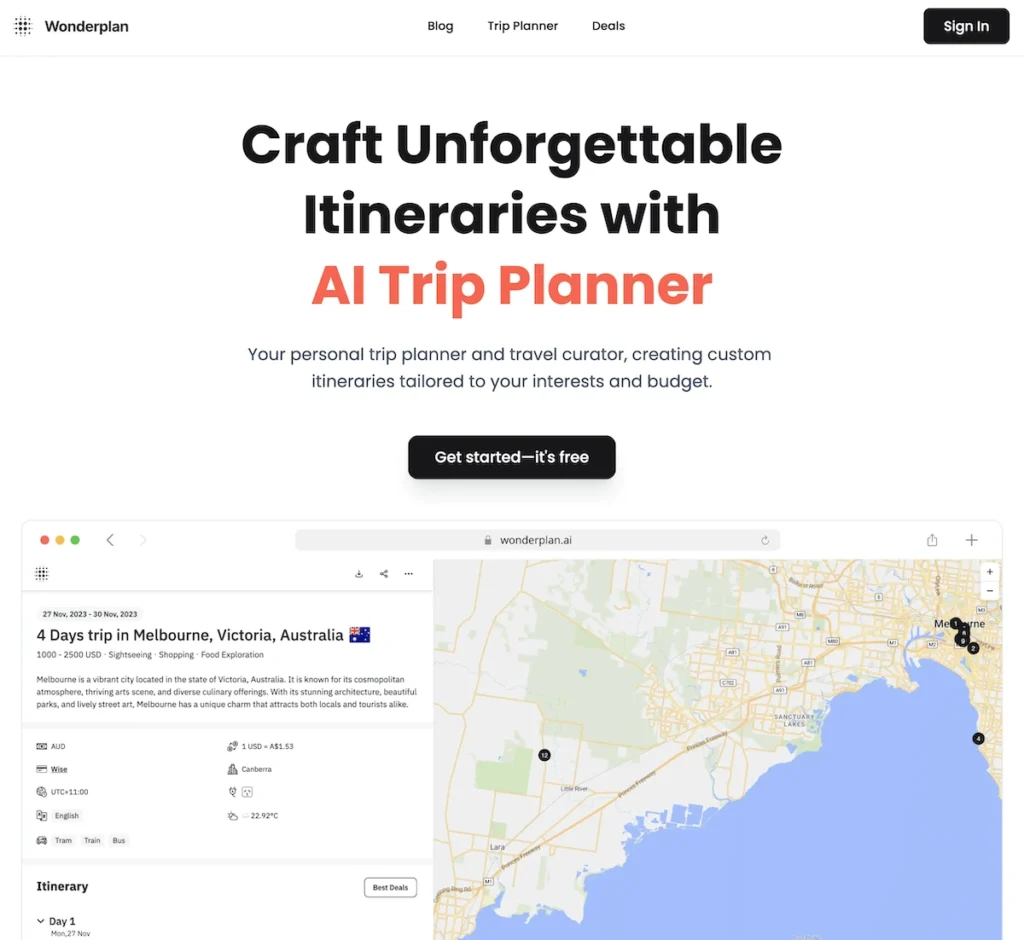
Primary Focus: Budget-aware itinerary creation with interactive, visual planning interface
Platform: Web (mobile-optimized), no dedicated mobile app
Pricing: Free (currently no premium tier)
Best For: Budget travelers, students, backpackers, visual planners
What Makes Wonderplan Special
Wonderplan’s AI helps build itineraries while displaying real-time budget impacts, offering suggestions for cost-effective activities, accommodations, and dining that fit user-defined spending limits.
Key Features
- Budget-First Approach: Built-in budget tracking with cost breakdowns by activity, addressing the major pain point of budget management
- Interactive Map Interface: Drag-and-drop planning with visual map integration
- Real-Time Cost Updates: See how each addition affects your total budget instantly
- Collaborative Planning: Features for planning trips with friends or family
- Visual Planning: Map-based interface makes geographic relationships clear
- Completely Free: No premium tier or hidden costs
AI Integration Depth
Medium-High. Wonderplan’s AI focuses on cost optimization and budget balancing, learning which types of accommodations and activities fit your financial comfort zone.
Strengths
✅ Best-in-class budget management and financial transparency
✅ Ideal for backpackers, students, or anyone prioritizing cost control
✅ Interactive, visual planning makes complex trips easier to manage
✅ Completely free with no premium tier
✅ Makes planning process collaborative and visually appealing
Limitations
❌ Web-only platform; no dedicated mobile apps for iOS or Android
❌ Less polished than mobile-first competitors
❌ AI depth focused primarily on budgeting, less on personalization
❌ Fewer integrations with booking platforms
❌ Some users report occasional AI-generated detail inaccuracies
Ideal User Profile
- Budget-conscious travelers prioritizing cost control
- Students and backpackers managing limited funds
- Families tracking expenses across multiple travelers
- Visual thinkers who prefer map-based planning
- Users comfortable with web-based tools
5. Google Travel with Gemini — The Comprehensive Ecosystem
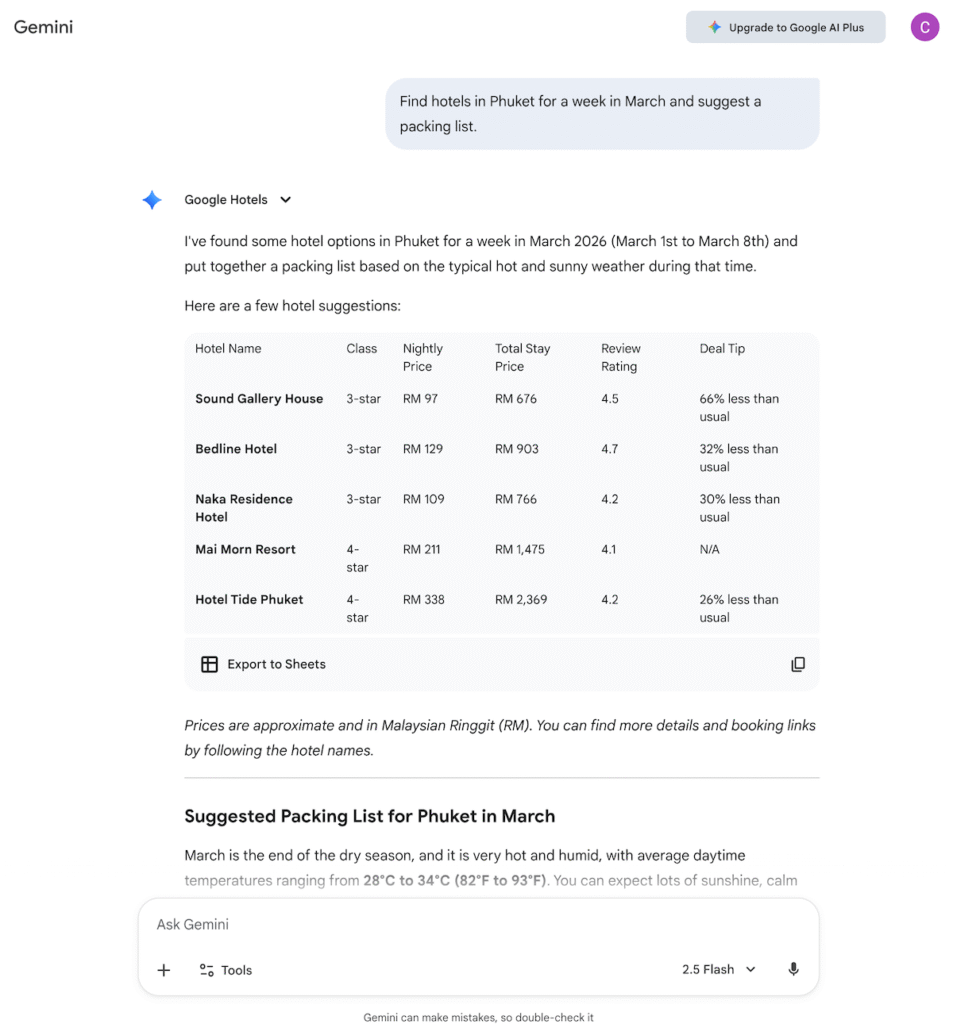
Primary Focus: Holistic travel planning integrated across Google’s product ecosystem
Platform: Web, integrated with Google Search, Maps, Gmail, and Gemini app (iOS, Android)
Pricing: Free (built into Google products); Gemini Advanced features require Google One AI Premium ($19.99/month)
Best For: Google ecosystem users, data-rich planning, real-time assistance
What Makes Google Travel with Gemini Special
Google has integrated its powerful Gemini AI into its travel ecosystem (Google Search, Maps, Gemini app) to offer seamless planning experiences. The system leverages search history, saved locations, and real-time Google data (Maps traffic, business hours, flight prices) to provide dynamic, relevant suggestions.
Key Features
- AI Overviews in Search: Users can search for things like “create an itinerary for Costa Rica with a focus on nature” and receive snapshot information at the top of results with expandable maps
- Gemini “Gems” for Travel: Custom AI assistants users can train for specific needs, like a “Sustainable Travel Gem” or “Pet-Friendly Planner Gem”—specialized instances configured with predefined prompts and preferences
- Deep Research Capability: Generate in-depth travel reports and even audio summaries, demonstrating multimodal capabilities
- Screenshot to Itinerary: Google Maps’ new feature powered by Gemini can identify locations from saved images and compile them into mappable itineraries
- Price Tracking: Track both flight and hotel prices with alerts for price drops based on chosen dates, destinations, and filters like star ratings or beach access
- Gmail Auto-Assembly: Automatically compiles trip details from Gmail confirmations
- Real-Time Maps Integration: Gemini API now includes Google Maps grounding, accessing data from over 250 million places for accurate, location-relevant responses
- Conversational Planning: Natural language queries across Search and Gemini app
AI Integration Depth
Very High. Gemini’s deep integration with Google Flights, Google Hotels, and Google Maps enables real-time pricing, availability, and location data. Ability to leverage Gmail, YouTube history, and search data (with permission) allows unprecedented personalized recommendations.
Strengths
✅ Most comprehensive ecosystem integration—everything works together seamlessly
✅ Access to over 250 million places worth of real-time data for factually grounded recommendations
✅ Free for basic features; no additional app downloads needed
✅ Can export itineraries to Docs or Gmail, or save as custom lists in Google Maps
✅ Exceptional for users already in Google ecosystem
✅ Google is one of the top sources for travelers researching trips
Limitations
❌ The dedicated trip planner initially showcased in 2024 for Gemini Advanced is no longer a priority and may not come to fruition
❌ Fragmented experience across multiple Google products
❌ Privacy concerns for users uncomfortable sharing data across Google services
❌ Best features require Google One AI Premium subscription ($19.99/month)
❌ Can feel overwhelming due to feature breadth
Ideal User Profile
- Heavy Google ecosystem users (Gmail, Maps, Search, Calendar)
- Travelers who value data-rich, comprehensive information
- Users comfortable with Google’s data integration
- Travelers seeking real-time, location-aware assistance
- Anyone wanting free baseline AI travel features
See also: Gemini vs ChatGPT: The Real-Life Travel Planning Showdown (2025 Comparison)
Comprehensive Comparison Matrix
| Feature | Layla | TripIt | Mindtrip | Wonderplan | Google Travel/Gemini |
|---|---|---|---|---|---|
| Primary Strength | Instant itinerary generation | Booking organization | Visual planning & booking | Budget management | Ecosystem integration |
| AI Depth | High (GPT-3) | Medium (automation) | Very High (LLM-native) | Medium-High (budget) | Very High (Gemini) |
| Speed | ⭐ Fastest | N/A (organizes existing) | Fast | Moderate | Fast |
| Pricing | Free | Free/$49/yr | Free (commission) | Free | Free/$19.99/mo |
| Budget Tools | ✔️ Deal finding | ❌ Limited | ✔️ Real-time pricing | ⭐ Excellent | ✔️ Price tracking |
| Group Features | ✔️ Bucket lists | ❌ Basic sharing | ⭐ Excellent | ✔️ Good | ❌ Limited |
| Platform | iOS/Android/Web | iOS/Android/Web | iOS/Android/Web | Web only | Integrated (all Google) |
| Booking Integration | Links (Booking.com, Skyscanner) | Not applicable | ⭐ Direct booking | Limited | Direct (Flights, Hotels) |
| Visual Appeal | Good | Basic | ⭐ Excellent | Good | Good |
| Offline Access | ❌ Limited | ✔️ Full | Partial | ❌ No | Partial |
| Best User Type | Spontaneous explorers | Business travelers | Visual/social planners | Budget travelers | Google ecosystem users |
How to Choose the Right AI Travel Assistant
Decision Framework
If you need instant inspiration and quick planning:
→ Layla generates complete itineraries in seconds from simple prompts.
If you travel frequently and need automated organization:
→ TripIt automatically consolidates all bookings into one clean itinerary.
If you’re a visual planner who loves beautiful interfaces:
→ Mindtrip offers the most engaging, photo-rich planning experience with direct booking.
If you’re on a tight budget:
→ Wonderplan provides unmatched budget tracking and cost-conscious recommendations.
If you’re already in the Google ecosystem:
→ Google Travel with Gemini offers the most comprehensive, data-rich experience.
Consider These Questions
- What’s my planning style?
- Spontaneous → Layla
- Visual/Creative → Mindtrip
- Organized → TripIt
- Budget-focused → Wonderplan
- Data-driven → Google Travel/Gemini
- What’s my budget priority?
- Strict budget → Wonderplan
- Deal hunting → Layla
- No cost, full-service → Mindtrip (free with commission model)
- No cost → Layla, Wonderplan, TripIt (basic), or Google (basic)
- Premium features → TripIt Pro
- How do I travel?
- Business/frequent → TripIt
- Social media-inspired → Mindtrip
- Spontaneous/last-minute → Layla
- Budget backpacking → Wonderplan
- All types → Google Travel/Gemini
- Do I need offline access?
- Essential → TripIt (full offline)
- Partial is fine → Mindtrip, Google
- Not critical → Layla, Wonderplan
- Platform preference?
- Need mobile apps → Layla, TripIt, Mindtrip
- Web is fine → Wonderplan
- Already on Google → Google Travel/Gemini
The Future of AI Travel Assistants (Beyond 2025)
The evolution of AI travel technology shows no signs of slowing. Here’s what’s emerging:
1. Content-to-Itinerary Conversion
Mindtrip’s “Start Anywhere” feature and similar innovations allow users to convert travel inspiration from social media, blogs, or videos into actionable itineraries instantly—bridging the gap between discovery and planning.
2. Real-Time Location Intelligence
Google’s Maps grounding in Gemini API enables AI models to access real-time data from over 250 million places for accurate, context-rich responses that reduce hallucinations.
3. Multimodal Planning
Deep Research features can generate in-depth travel reports and audio summaries, demonstrating AI’s multimodal capabilities for complex information synthesis.
4. Voice-First Assistants
Hands-free planning through voice commands is becoming standard, allowing travelers to plan while multitasking.
5. Sustainability Optimization
Eco-friendly trip routing that balances carbon footprint with convenience, recommending trains over flights or sustainable accommodations.
6. Predictive Personalization
AI that anticipates needs before you articulate them, suggesting destinations based on subtle cues like weather preferences or life events.
Final Thoughts: Choosing Your Digital Travel Companion
Travel planning used to mean spreadsheets, browser tab overload, and decision fatigue. In 2025, AI travel assistants have fundamentally rewritten that experience—combining machine intelligence with human wanderlust to create smarter, more personalized journeys.
Each platform serves a distinct traveler archetype:
- Layla → Spontaneous explorers who want instant inspiration and plans
- TripIt → Organized professionals who need automated logistics management
- Mindtrip → Visual planners and content creators seeking immersive, social-first experiences
- Wonderplan → Budget maximizers seeking financial transparency
- Google Travel/Gemini → Data-driven users valuing comprehensive ecosystem integration
The key insight: You don’t need all of these tools—you need the right one for your travel style.
Pro Tips for Success:
- Start with one platform that matches your primary need (speed, budget, organization, detail, ecosystem)
- Test during a small trip before committing to major travel plans
- Combine strategically if needed (e.g., Layla for planning + TripIt for organization, or Mindtrip for discovery + booking)
- Provide detailed input to help AI personalize recommendations effectively
- Stay flexible and remember AI is a tool, not a replacement for spontaneity
The future of travel isn’t just about where you go—it’s about how smartly you get there. With the right AI assistant, your next adventure starts before you even pack your bags.
Quick Selection Guide
| Your Priority | Recommended Tool | Why |
|---|---|---|
| Speed/Inspiration | Layla | Generates complete plans in seconds |
| Organization | TripIt | Automated email-to-itinerary |
| Visual Planning | Mindtrip | Beautiful, photo-rich interface with direct booking |
| Budget Control | Wonderplan | Best cost tracking and transparency |
| Ecosystem Integration | Google Travel/Gemini | Seamless across Google products |
| Business Travel | TripIt Pro | Real-time alerts and automation |
| Content Creation | Mindtrip | Creator program with monetization opportunities |
| Free & Full-Service | Mindtrip or Layla | Both offer comprehensive free experiences |
Last updated: October 2025. Features and pricing subject to change. Always verify current capabilities on provider websites before committing to any platform.
See also: AI Fitness Coach Apps 2025: Top 5 Proven Picks



2 Comments
I never thought about it this way before. Your post gave me a fresh perspective.
hmmm seems work for me